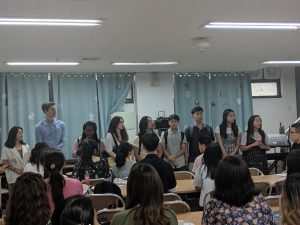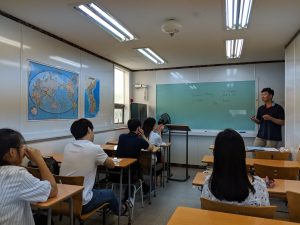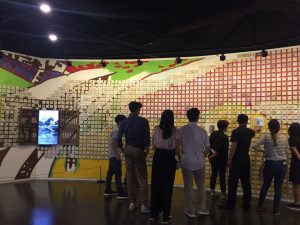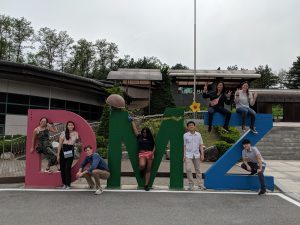“…길고 긴 여행을 끝내 이젠 돌아가…” –
“…the long journey has ended and now I return…”
When I applied to DukeEngage South Korea, I really didn’t know what to expect. I knew that it would be educational. I knew that it would be hard. I knew that it would be fantastic. What I didn’t know was that I would learn more about my Korean heritage than I would have ever expected. My understanding of North-South Korean relations was broadened and expanded during our stay at the Reunification Education Center. I was able to visit Gwangju and Ganghwa for the first time to learn more about my heritage’s rich history and expand my assumptions and existing knowledge about the Korean people (more on that later). What I didn’t know was that life still rolls on around you even while you are teaching the students that you love but who are experiencing some of the most difficult circumstances that anyone could ever imagine. Teaching is not only physically taxing, but mentally and emotionally consuming. Sometimes, I didn’t have the energy to teach or I couldn’t help but break down when I felt overwhelmed. But probably the thing I really didn’t know, and perhaps the most important thing that I learned is how rewarding my experience would be during DukeEngage South Korea.

DukeEngage South Korea’s first meal together as a team in South Korea.
Gwangju and Ganghwa Island
Personally, learning about the Gwangju Uprising and actually going to visit the city itself was a very powerful moment during our two months in DukeEngage South Korea. The Gwangju Uprising, or May 18th as it is referred to in South Korea, occurred in 1980 during the aftermath of the long-running dictatorship of Park Jeong Hee and the ascendance of Chun Doo Hwan. Chun enforced an “emergency” martial law all over the country but college students in Gwangju rebelled. The military response to the demonstrations with South Korean paratroopers were so violent and cruel that the entire city and its citizens raised up in full protest against the South Korean military. For ten days, Gwangju citizens fought, young and old alike, against the military but due to the extreme censoring at the time, most of South Korea and the world had no idea what was going on. Still today, Gwangju citizens feel the ache of lives lost and missing due to the events in May of 1980. However, what is most admirable and powerful about learning about this event is the pride and dedication of Gwangju’s citizens. During our visits to the memorials and museums, I couldn’t help but admire the stories about the taxi and bus drivers who drove out into the chaos to rescue the injured or the passionate quotes from the very students who had led the uprising. It was an honor and a privilege to pay respects to those who had passed at the May 18th National Cemetery.

We all had the honor of paying our respects at the May 18th National Cemetery.
As someone who had grown up in Seoul and had never really travelled to many other areas in South Korea, it was fascinating to actually see for myself the differences between Seoul and Gwangju and their citizens. I was curious about the sociological legacy of the Gwangju uprising was surprised to find out that even today some people hold suspicions about Gwangju citizens. Economically, the southeastern side of South Korea is more advanced than its western side. I also noticed this because being in Gwangju reminded me of what Seoul looked like more than ten years ago. The fashion trends of Seoul seemed to not have fully embedded themselves in Gwangju, and even the food tastes different. However, differences do not indicate that one is somehow better than the other. If anything, I was ecstatic to see that even in South Korea, a country that is barely the size of New Jersey, has such cultural diversity and individuality.
Going to Ganghwa Island was an enriching experience because there was a whole other area of foods and historical landmarks I had never seen before. We got to try large-eyed herring, a specialty of the area, and pumpkin rice punch (which is quite different from regular rice punch). I think one of the most iconic things we got to see was the first Anglican Church of Ganghwa Island. The architecture was incredibly unique because it was a mix of traditional Korean and Western styles. We also learned about how Ganghwa Island has almost been the gateway during invasions and battles with countries like Japan, France, and even the United States, because of its access into the Imjin and Han River.

DESK members at a Buddhist temple on Ganghwa Island.
다시 만날 때… (When I see you again…)
I mean, Gwangju and Ganghwa Island were great and all, but I’m definitely stalling on providing my last thoughts about DukeEngage South Korea 2019. (I’m actually very horrible at goodbyes. I tend to just overlook them and convince myself that this goodbye is pointless because, I mean, of course we’ll see each other again right? I’m working on it haha.) I’m probably going to be that DukeEngage-er, “DukeEngage was best summer I’d ever had” or “DukeEngage was a turning point in my life.” But, you know, it was. I guess to put it simply: I loved it. I had an absolute blast. Even with the strange hours and the hardships of teaching, it was the most amazing experience. I don’t really want to go home.
But that’s the thing.
If there’s anything I’ve learned in my very long twenty years of life (shhh I know, I know, I’m still very young, it’s called being ironic haha), home is where and what you make it. I guess what I’m trying to say is, DukeEngage South Korea was home. Granted I guess it’s much easier for me to say that compared to the other DESK members because I’ve lived here before, I speak the language, my extended family still lives here, I’m Korean, yada yada. But I think I may understand more than anyone what our students who we’ve taught this summer have to go through sometimes. I know what’s it like to be South Korean, but you’re also…not. I know what it’s like the minute that you trip over a word or make any indication that you’re not “fully” South Korean that people will switch to English with you or make assumptions about you because you’re not “really Korean.”
Don’t get me wrong, my years in South Korea were completely different than the experiences of the students of Jiguchon or Woorideul. I was privileged in many ways: socially, economically, etc. But I know what it feels like to so desperately want somewhere to feel like home but having to fight the assumptions and prescriptions from other people about who you are and where you are from. And I think there wasn’t really anything that I was able to convey or give my students about these kinds of things. If anything, they were the ones who solidified and reinforced my faith in being able to “be both.” One can be both Korean and Chinese. Maybe Vietnamese and Korean. Not North Korean or South Korean, just Korean. Or maybe you are North Korean and that’s not South Korean. Or maybe even Korean and American. You get to define you are, where you are from, and where home is.
The last two months and the time I’ve spent with these students who I have connected to, has made DukeEngage South Korea 2019 home for me. The professors Kims who took such good care of us and whether they tried to or not, we definitely felt like their children. They really taught us and took care of us so well. And my DukeEngage team…
Wow. Um.
I’m going to be a little selfish and spend a hot minute being a little mushy gushy about my team. Even through all the little arguments and my (constant) nagging, I promise I have come to love each and every single one of you from the bottom of my heart. I can’t help it, if I like you, you become mine forever (mwahahaha). But above all, you guys made South Korea more of a home than it has ever been before.
So I guess my point is, it makes sense that I don’t want to go “home” back in Georgia or at Duke, because I’ve made a home for myself during DukeEngage South Korea 2019 thanks to our students, their teachers, our professors, and the entire team.
But if there’s anything to know about “home,” it’s never really good-bye, because you always make your way back.
사랑합니다

감사합니다
“…너라는 집으로 지금 다시 way back home…”
“…back to the home that is you, I’ll be on my way back home again”
Way Back Home by Shaun
(Written on July 23rd, 2019)





